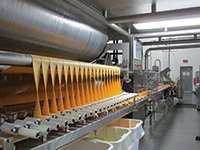 |
|||

|  |

|
|

February 9, 2018 |
|||||||||
| Whitehall Specialties’ formulations aim to meet evolving customer needs Company says innovation is essential for future growth |
|||||||||
By Kate Sander WHITEHALL, Wis. — Problem solving — whether it’s improving functionality, nutrition or value — is what processed cheese manufacturer Whitehall Specialties concentrates on daily for each of its customers. “Innovation is at the core of what we do,” says Karl Kramer, Whitehall Specialties’ president and CEO. “We offer new products and concepts based on our extensive, industry-renowned formulation expertise.” Headquartered in Whitehall, Wisconsin, Whitehall Specialties offers customers a broad line of high-quality, high-value cheese products, natural and imitation cheese blends, cheese substitutes and imitation/analog cheeses. Building on its foundation of formulation expertise, innovation, manufacturing excellence and long-standing customer relationships, Kramer — who has been at the helm of Whitehall for almost three years — seeks to take the company to the next level by enhancing its unique, value-added product offerings to better meet the ever-changing needs of its customers. This includes meeting the demands of customers looking for “better for you” products, cleaner labels and other high-growth opportunities, he says. Whitehall offers a full range of cheese types in various configurations, including block, loaf, shredded, diced, sliced, dried and grated, as well as other specialty styles. The company has hundreds of base recipes that can be customized to meet customers’ specific requirements with respect to flavor, cost, functionality and nutritional aspects, Kramer says. The company’s largest customer base is industrial customers, who use Whitehall products as ingredients in a variety of finished food products. This is followed by retail, for which Whitehall offers both branded and private label products.
Whitehall also does business in the foodservice arena, and Kramer sees this area as one of significant potential growth. “We see a big opportunity in foodservice to use our formulation abilities to create compelling value propositions for customers,” he says, noting that the company has the ability to create products where key functional traits such as melt, stretch, texture and other characteristics can be customized to meet the needs of a specific application. Kramer also expects international customers to be an important growth area for Whitehall. The company currently exports to 28 countries around the world, and Kramer sees an “excellent opportunity” to expand product offerings in these well-established areas as well as reach new markets in other regions of the world. Across all customer categories, there are several areas in which the company is growing, Kramer says. One key area the company is focusing on is “better for you” products. Because it makes non-standardized cheese products, Whitehall can enhance products with additional fibers, protein, calcium, vitamins and minerals, and other desired nutrients. On the flip side, the company also can reduce or eliminate what are often considered undesirable characteristics, for example creating cheese products that have less sodium and fat than standardized cheeses. “We don’t pretend to be operating in the natural cheese arena,” Kramer says. “Our company is predicated on great-tasting, affordable nutrition with functionalities that natural cheese can’t always provide.” The key, Kramer says, is creating products that customers want to eat and will buy again. “We can talk about these capabilities all we want, but if the product doesn’t taste good, nobody’s going to buy it,” Kramer says. Whitehall’s expert staff recognizes flavor and performance are critical in product development.
Headed by Dave Kelsey who has 35 years of industry experience, the R&D department has a solid foundation from which to innovate. R&D works closely with Rick Hartman, who heads operations, to understand the manufacturing nuances of products and create ones that are sustainable from a production standpoint, Kramer says. The two teams work together to vet and commercialize innovative ideas. “We prioritize the big ones, and identify and eliminate the roadblocks,” Kramer says. The company develops its innovative ideas from a combination of observing trends in the marketplace as well as responding to customer requests. The company has a core customer base that it works closely with, and it has expanded its sales team in an effort to better understand those customers’ needs and how to address them. Kramer also has added to the company’s experienced, veteran employee base by bringing in new employees to introduce new ideas and ways of working as well as an expanded broker network that is broadening the customer base. As evidence of working even more closely with customers and understanding their needs, Kramer says Whitehall is emphasizing providing cleaner labels with pronounceable ingredients. “We know that there is a general trend for consumers who want cleaner label products,” he says. “As a result, we are revamping many of our formulas to offer fewer ingredients and ‘kitchen cupboard’-type ingredients.” Kramer says he is especially excited about the company’s clean label innovation in some of the hard cheese types like Parmesan and Romano. “We’re also working on a clean label Mozzarella product,” he says, noting that, in addition to improved functionality, these products often provide an attractive value proposition versus other products on the market.
As part of its growth strategy, Whitehall also is expanding its ability to supply customers in high growth markets, such as non-GMO, organic, vegan and kosher. “We expect these to have a greater role in our portfolio moving forward,” Kramer says. The company’s production scale and flexibility allow it to quickly move between products and meet a large range of needs, Kramer says. “On the manufacturing side we’re able to quickly transition from one product to another. Our operational efficiencies allow us to tailor offerings for our customers,” he says. In addition to two facilities in Whitehall, the company operates a production facility in Hillsboro, Wisconsin, as well as a plant it acquired in Slippery Rock, Pennsylvania, in the summer of 2016 to better serve its East Coast customers. “Pennsylvania has turned out to be a great acquisition for us. It’s running even better than expected,” Kramer says, noting that since the acquisition the company has added drying capabilities that are now running 24/7. The company also has expanded block cheese production there. The company’s 5-year growth plan relies heavily on the Pennsylvania facility. “We’re really happy with the performance there,” Kramer says, noting that the company will always be located in Whitehall, Wisconsin, but that there is limited expansion space available at its Wisconsin facilities. “We’re fully engaged in Wisconsin, and there’s plenty of work for everyone,” Kramer says, adding that the Pennsylvania plant, with ample space and a solid labor market, offers Whitehall opportunities for future expansion. All three Wisconsin facilities are SQF Level 3 certified, and the Pennsylvania facility currently is undergoing SQF certification as well. CMN
|
|||||||||
| CMN article search |
|
|
© 2025 Cheese Market News • Quarne Publishing, LLC • Legal Information • Online Privacy Policy • Terms and Conditions
Cheese Market News • Business/Advertising Office: P.O. Box 628254 • Middleton, WI 53562 • 608/831-6002
Cheese Market News • Editorial Office: 5315 Wall Street, Suite 100 • Madison, WI 53718 • 608/288-9090

